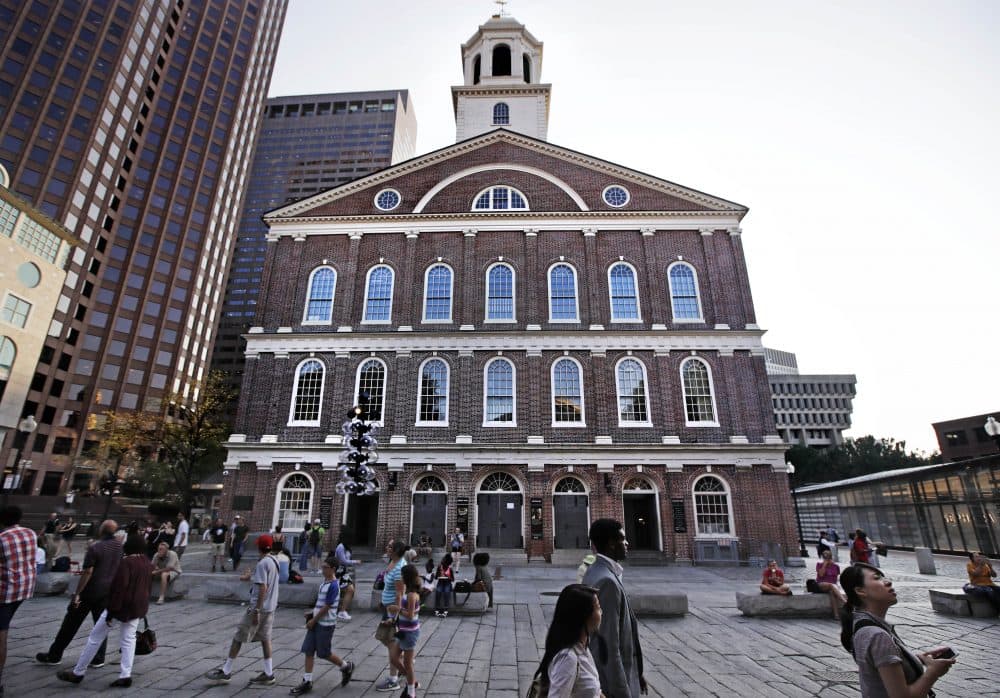Advertisement
How Should Boston Reckon With The Complicated History Of Faneuil Hall?
Resume
For years, Boston has been reckoning with the city's complicated history around race. The city has installed plaques to memorialize enslaved people, removed a Confederate statue on Georges Island, and recently renamed Yawkey Way after a legacy of racism was leveraged against Red Sox owner and philanthropist, Tom Yawkey.
The conversation has turned now to Faneuil Hall. The meeting house turned tourist attraction is named for Peter Faneuil, known as one of the richest merchants in 18th century New England. He was also a slave owner and slave trader.
A new memorial that would resemble a slave auction block has been proposed by Steven Locke, an artist-in-residence for the city of Boston for 2018. The memorial would be dedicated to the African-Americans who were sold at Faneuil Hall and whose labor financed the hall's construction.
This proposal comes amid an ongoing campaign by the New Democracy Coalition to change the name of Faneuil Hall. The coalition suggests renaming the landmark after Crispus Attucks, a black man who was killed during the Boston Massacre.
Guests
Steven Locke, artist-in-residence for the city of Boston for 2018. He is also a professor at MassArt. He tweets @steve_locke.
Kevin Peterson, founder and executive director of the New Democracy Coalition. He is also a senior fellow at the Center for Collaborative Leadership at UMass Boston.
Interview Highlights
On experiencing Faneuil Hall today
Kevin Peterson: "When I go to the Faneuil Hall marketplace area, although I know the history, I don't see myself represented in any significant way. And that's a problem — not only for my generation but for generations that will come, of Bostonians in particular, but also the 20 million people who come through the marketplace each year. They don't see Boston's complete history, and that's problematic."
Steven Locke: "I see this really vibrant area that's filled with commerce and tourism and students, all sorts of people engaged with the history of Boston ... but also, as an artist, I'm trained to notice what's missing, and I also notice what's present. We memorialize a lot of things in that area of the city, and the thing that we do not memorialize — by choice, not by circumstance, but by choice — we do not memorialize the people who built that building ... It's a beautiful part of city, but it's also a slave market."
On how Boston confronts its role in slavery
KP: "In the spirit of what's been happening around the country — Confederate monuments have been coming down across the south, some of our major universities ... have re-purposed and renamed edifices that are on [those campuses] because they're connected to slavery — I say, symbolically, we rename Faneuil Hall. We don't rename every edifice that's named after a slaveholder who may be connected to Boston — that would be exhaustive and redundant, cost a lot of money. But we focus on a place like Faneuil Hall, which has sort of a mixed history, but one that's really connected to the agony of people being enslaved ... and having it always stand as opportunity for conversations around reconciliation and ... engaging citizens across the city."
SL: "I think that it's really hard to live with history, and I think history is not black, it's not white, it's not colonial — it's just history. And the problem is that one history has been privileged over another. And so, to rename is one way to deal with history. But I don't want to let Peter Faneuil or Andrew Faneuil off the hook. I want everyone who comes to Boston to know that those people were slavers, and I want people to know that the cradle of liberty was built by slavers."
On differing ideas of memorialization
KP: "It's problematic for many Bostonians of color who ... are coming to know the history in a fuller light over the last year, year and a half or so. It really hurts their heart that there's this edifice that is iconic but represents something that is very, very painful. And some folks have said to me that it would be unconscionable for the edifice that represented the success of a German trader under Hitler, who was a supporter, to have that in Brookline or a majority-Jewish community, for example. It would be painful for someone in East Boston, where there was historically an Italian community, to have [an edifice of] someone who was a supporter of Mussolini, for example, in their community ... I would hope that others, who are not of color, what they would try to understand is that this edifice is painful, and that we don't erase history by assigning a new utility to the building — we're adding to, in some ways, to the painfully rich history."
SL: "It's very hard to deal with America as a black person, and Faneuil Hall is just a subset of that. Like, every time I put on a cotton shirt, I think about my family. So that history is part of the weight that black people have to bear. What I want to have happen is I want to produce an object that's going to share that burden on the people who created it. Because we always talk about slavery, but we never talk about the people who enslaved people."
This segment aired on July 19, 2018.

